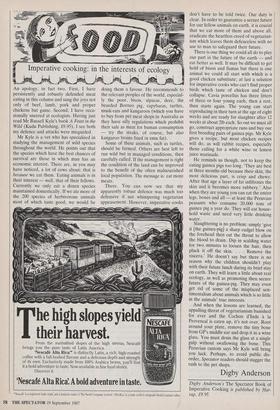a Imperative cooking: in
the interests of ecology
.)11%ft An apology, in fact two. First, I have persistently and robustly defended meat eating in this column and sung the joys not only of beef, lamb, pork and proper chickens but game. Second, I have occa- sionally sneered at ecologists. Having just read Mr Russell Kyle's book A Feast in the Wild (Kudu Publishing, £9.95), I see both my defence and attacks were misguided.
Mr Kyle is a vet who has specialised in studying the management of wild species throughout the world. He points out that the species which have the best chances of survival are those in which man has an economic interest. There are, as you may have noticed, a lot of cows about: that is because we eat them. Eating animals is in their interest — well, that of their fellows. Currently we only eat a dozen species maintained domestically. If we ate more of the 200 species of herbivorous animals most of which taste good, we would be doing them a favour. He recommends to the relevant peoples of the world, especial- ly the poor, bison, alpacas, deer, the bearded Borneo pig, capybaras, turtles, musk-rats and kangaroos (which you have to buy from pet meat shops in Australia as they have silly regulations which prohibit their sale as meat for human consumption — try the steaks, of course, but also kangaroo brains fried in emu fat).
Some of these animals, such as turtles, should be farmed. Others are best left to run wild but in managed conditions, then carefully culled. If the management is right the condition of the land can be improved to the benefit of the often malnourished local population. The message is: eat more meats.
There. You can now see that my apparently robust defence was much too defensive if not whimpering vegetarian appeasement. However, imperative cooks don't have to be told twice. Our duty is clear. In order to guarantee a secure future for our fellow animals on earth, it is crucial that we eat more of them and above all, eradicate the heartless creed of vegetarian- ism which leaves them defenceless with no use to man to safeguard their future.
There is one thing we could all do to play our part in the future of the earth — and eat better as well. It may be difficult to get hold of bison and llamas but there is one animal we could all start with which is a good chicken substitute; at last a solution for imperative cooks who can't find proper birds which taste of chicken and don't collapse. Cavia porcellus has three litters of three or four young each, then a rest, then starts again. The young can start reproducing in their turn at the age of eight weeks and are ready for slaughter after 12 weeks at about 21b each. So out we must all go, construct appropriate runs and buy our first breeding pairs of guinea pigs. Mr Kyle gives a recipe, but most chicken recipes will do, as will rabbit recipes, especially those calling for a white wine or lemon juice marinade.
He reminds us though, not to keep the eating guinea pigs too long. 'They are best at three months old because their skin, the most delicious part, is crisp and chewy. After that age a layer of fat infiltrates the skin and it becomes more rubbery.' Also when they are young you can eat the entire legs, bones and all — at least the Peruvian peasants who consume 20,000 tons of guinea pig a year do. They will eat house- hold waste and need very little drinking water.
Slaughtering is no problem: simply 'give it [the guinea-pig] a sharp cudgel blow on the forehead then cut the throat to allow the blood to drain. Dip in scalding water for two minutes to loosen the hair, then pluck it off the skin. . . . Remove the viscera.' He doesn't say but there is no reason why the children shouldn't play with their future lunch during its brief stay on earth. They will learn a little about real ecology, as well as promoting then secure future of the guinea-pig. They may even get rid of some of the misplaced sen- timentalism about animals which is so little in the animals' true interests.
And when the lessons are learned, the appalling threat of vegetarianism banished for ever and the Cochon d'Inde a la Provencal is eaten up, it's not over. Root around your plate, remove the tiny bone from GP's middle ear and drop it in a wine glass. You must drain the glass at a single gulp without swallowing the bone. This Peruvian custom says Mr Kyle will bring you luck. Perhaps, to avoid public dis- order, Spectator readers should stagger the rush to the pet shops.
Digby Anderson
Digby Anderson's The Spectator Book of Imperative Cooking is published by Har- rap, f9.95.


































































 Previous page
Previous page